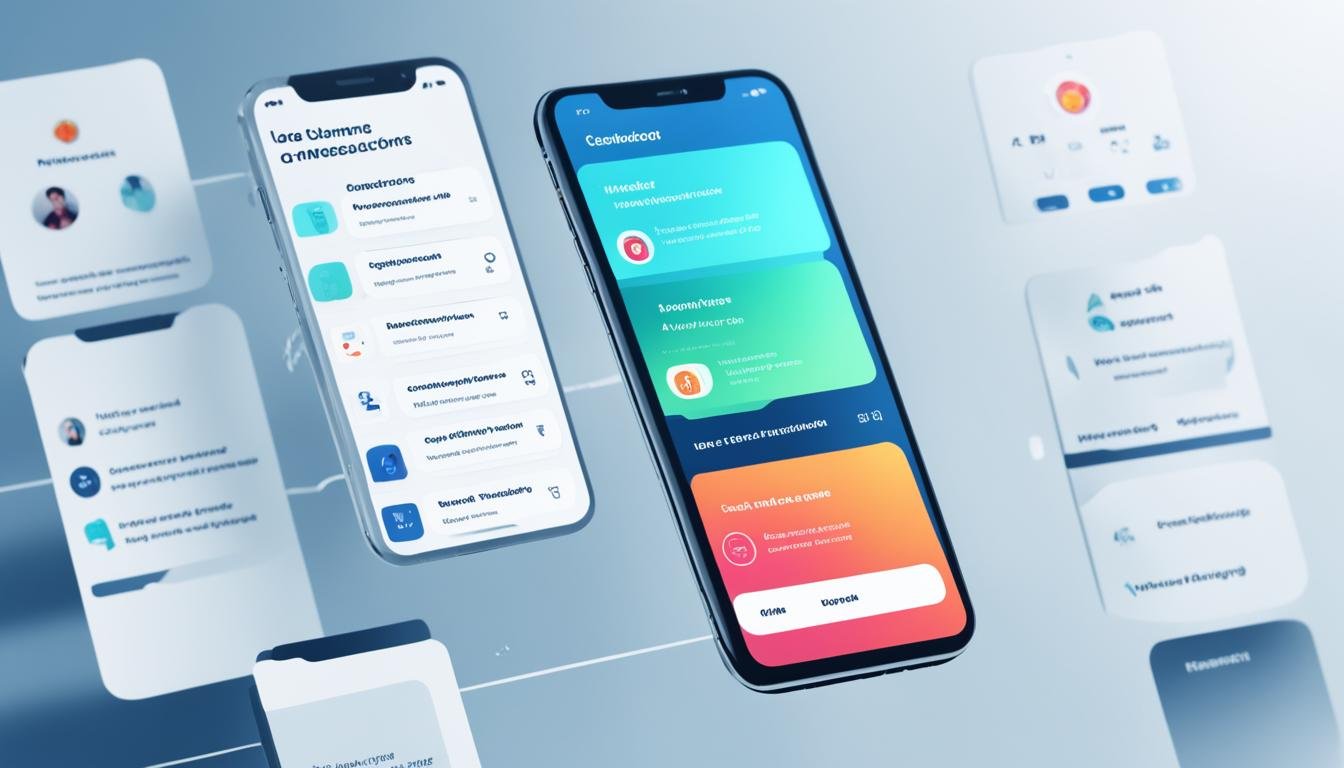Heads up – This post includes affiliate links. If you click and purchase, I may received a commission at no extra cost to you. I only recommend products which I have personally vetted.
AI is transforming mobile app development at a rapid pace. The global AI market is set to hit $126 billion by 2025. This growth is reshaping how we create and use mobile apps.
AI-powered innovations are revolutionizing the mobile app world. These advancements offer personalized experiences and streamline app development. They’re shaping the future of mobile technology in exciting ways.
Key Takeaways
- The global AI market is projected to reach $126 billion by 2025, fueling the integration of AI into mobile app development.
- AI-powered mobile apps are enhancing customer experiences, service quality, and driving competitive advantages for businesses.
- AI integration in mobile apps can boost revenue by up to 300% in the industry, according to Accenture.
- The healthcare industry is expected to increasingly rely on AI-driven mobile app development, with a projected CAGR of 43.5% by 2027.
- AI is revolutionizing the app creation process, from personalized recommendations to automated testing and deployment.
Introduction to AI in Mobile App Development
AI technology has revolutionized mobile app development. It has opened up new possibilities for innovation. Developers can now create smarter, more intuitive, and personalized mobile experiences.
Understanding AI Technology
AI applications in mobile app development use machine learning, natural language processing, and computer vision. These technologies allow apps to learn from data and understand user behavior. They can adapt to user preferences, improving the overall experience.
Why Use AI in Mobile App Development
AI offers numerous benefits in mobile app development. It enables personalized recommendations, predictive analytics, and virtual assistants. These features significantly enhance the creation of mobile apps.
AI integration in mobile apps leads to more engaging and efficient experiences. It also improves security and better caters to user needs.
- Enhanced user personalization and intelligent recommendations
- Data-driven decision-making through predictive analytics
- Seamless conversational interfaces with virtual assistants and chatbots
- Improved security and fraud detection through AI-powered algorithms
- Optimization of development workflows and resource allocation
As AI technology evolves, its impact on mobile app creation will grow. It will transform how developers and users interact with mobile applications.
Revolutionizing User Experiences
AI-powered personalization is changing how mobile apps engage users. AI algorithms analyze user behavior and preferences to deliver personalized experiences. This enhances satisfaction and fosters stronger connections between apps and users.
Personalization increases engagement and retention rates. It ensures users receive tailored content and intuitive recommendations. This approach makes apps more valuable and user-friendly.
Enhanced Personalization and Intelligent Recommendations
AI-powered apps offer customized interfaces and adaptive recommendations. They suggest personalized content and products based on user preferences. This intelligent approach helps users find what they need quickly and easily.
Conversational Interfaces with Virtual Assistants and Chatbots
AI-powered virtual assistants and chatbots have changed how we interact with devices. They use natural language processing to understand queries and provide relevant information. These assistants can even perform tasks for users.
As AI assistants improve, they offer seamless and engaging experiences. This enhances overall app utilization and user satisfaction. The result is a more intuitive and helpful mobile app experience.
AI-driven features are creating a shift in mobile app experiences. They cater to each user’s unique needs and preferences. This leads to more engaging, efficient, and satisfying interactions.
The result is increased user loyalty and long-term app success. AI-powered personalization is shaping the future of mobile apps. It’s making them more responsive and valuable to users.
How AI is Changing Mobile App Creation
AI is revolutionizing mobile app creation. It’s shifting from click-based to conversational interfaces. AI also moves from hard-coded logic to semantic language models.
Developers now team up with AI to generate code and improve quality. AI makes app development more accessible to business users. It’s driving innovations that reshape the entire app development ecosystem.
- Over 56% of customers seek personalized recommendations and user experiences in mobile apps, and 92% of companies are already using AI-based personalization to enhance customer satisfaction.
- 81% of employees reported that AI tools have improved their work performance, leading to increased efficiency and cost savings for mobile app development teams.
- However, 45% of users find virtual assistants and chatbots frustrating, underscoring the need for AI-powered features to be carefully designed and integrated to provide a seamless user experience.
| AI Impact | Benefit |
|---|---|
| Automated processes and reduced human resources | Cost efficiency in mobile app development |
| Predictive analytics and data-driven decision-making | Improved user engagement and business insights |
| Facial recognition and secure authentication | Enhanced data security and fraud prevention |
AI’s impact on mobile app creation will keep growing. It will drive innovations in user experiences and development processes. AI will also improve app performance and security.
By using AI tech, developers can stay ahead. They can deliver exceptional experiences to their users.
Optimizing Performance and Efficiency
AI-powered predictive analytics is revolutionizing mobile app development. It uses historical data and machine learning to predict user behavior and trends. This empowers developers to make data-driven decisions that enhance user experience.
AI tools help businesses improve performance and manage resources more effectively. They analyze vast data sets to forecast accurately and make proactive choices.
Predictive Analytics and Data-Driven Decision-Making
AI-powered analytics uncovers patterns in large data sets. This leads to more accurate forecasting and smarter decision-making. It improves content recommendations, targeted ads, and resource optimization in mobile apps.
Resource Optimization and Cost Savings
AI optimizes resource allocation in mobile apps, saving businesses money. It identifies underused resources and streamlines processes. Machine learning algorithms ensure efficient use of resources.
AI-powered automation reduces manual work and human errors. This lowers operational costs and improves overall efficiency. AI and data-driven decision-making boost app performance and user satisfaction.

AI-Driven Security and Privacy
AI is transforming security and privacy in mobile apps. With billions of devices in use globally, AI-powered solutions are vital. These technologies detect threats, prevent fraud, and protect user data through robust authentication.
Fraud Detection and Threat Prevention
AI-powered fraud detection in mobile apps uses machine learning to analyze user behavior. It spots anomalies and suspicious activities, protecting apps and users. AI-driven threat prevention constantly monitors the app ecosystem.
It quickly identifies and responds to new security threats. This proactive approach keeps users safe from evolving risks.
Robust Authentication Mechanisms
AI-driven authentication has changed how users access digital services. Biometric methods like facial recognition and fingerprint scanning offer seamless security. Advanced behavioral analysis adds another layer of protection.
AI and mobile app access control solutions adapt and learn. They prioritize privacy and data security while improving the user experience.
| AI-Powered Security Features | Benefits |
|---|---|
| Fraud Detection | Proactive identification and prevention of fraudulent activities |
| Threat Prevention | Continuous monitoring and rapid response to emerging security threats |
| Biometric Authentication | Seamless and secure user access through facial recognition, fingerprint scanning, and behavioral analysis |
| Adaptive Access Control | Intelligent and evolving mechanisms to safeguard user privacy and data security |
AI enhances security and privacy in mobile apps, building user trust. It helps developers stay ahead of evolving threats. As demand for secure, intelligent apps grows, AI-driven solutions become crucial for success.
Natural Language Processing in Mobile Apps
NLP integration is vital in modern mobile app development. It allows apps to understand human language, enabling natural interactions. NLP enhances user experience through voice commands, text interpretation, and contextual responses.
NLP, a branch of artificial intelligence, processes human language in mobile apps. It improves overall user experience and makes interactions more intuitive.
Voice Commands and Natural Language Interactions
AI-powered apps use NLP for voice-controlled interfaces and natural language interactions. Users can issue voice commands, which NLP translates into actionable instructions. This hands-free feature boosts convenience, productivity, and accessibility.
Sentiment Analysis and Language Translation
NLP enables apps to analyze user sentiment and provide language translation. Sentiment analysis helps understand user emotions, allowing for personalized responses. Translation features improve accessibility by communicating in users’ preferred languages.
NLP integration offers a more intuitive experience, setting your app apart. The demand for AI-powered voice commands in mobile apps is growing rapidly. Implementing NLP in mobile app development can give you a significant edge.

AI-powered sentiment analysis in mobile apps and AI-driven language translation in mobile apps are transforming user experiences. NLP helps deliver seamless, personalized interactions. It makes your app an essential tool in today’s digital world.
Emerging Trends in AI for Mobile Apps
AI is revolutionizing mobile apps. Edge AI, on-device processing, multimodal interactions, and augmented reality (AR) are leading this change. These innovations are creating more interactive and efficient mobile experiences.
Edge AI and On-Device Processing
Edge AI lets apps perform AI tasks directly on your device. This means faster responses, better privacy, and improved offline use. Your apps can now adapt to your needs in real-time.
On-device AI processing reduces reliance on cloud-based systems. This shift leads to a more efficient and responsive user experience.
Multimodal Interactions and Augmented Reality
Multimodal interfaces combine voice, touch, and gestures for app control. This creates a more natural and intuitive way to use your apps.
AI-driven AR overlays digital info onto the real world. It enables immersive experiences that blend virtual and physical realities.
These AI trends are shaping the future of mobile apps. Edge AI in mobile apps and on-device AI processing are improving app performance.
Multimodal interactions in mobile apps and AI-powered augmented reality in mobile apps are enhancing user engagement. These innovative AI applications in mobile app development are creating more personalized experiences.
As AI trends in mobile app development advance, expect even more tailored and immersive app experiences. These will continue to meet users’ changing needs and preferences.
Challenges and Considerations
Data privacy in AI-powered mobile apps is a growing concern. Responsible AI use and data security are crucial. Addressing biases in AI algorithms builds trust in these apps.
Data Privacy and Ethical Concerns
Ensuring data privacy is a major challenge in AI-driven app development. Developers must protect user data and prevent breaches. They need to follow complex regulations like GDPR and CCPA.
AI algorithms can show biases based on training data. This may lead to unfair outcomes. Addressing these issues requires thorough testing and transparent practices.
Integration and Deployment Complexities
Integrating AI into mobile apps presents technical challenges. Developers must manage data and deploy models effectively. They need to work closely with data scientists and business stakeholders.
AI requires significant computational power and infrastructure. This creates deployment issues for mobile app developers. Ensuring efficient processing within mobile device limits is crucial.
AI in mobile apps offers opportunities and challenges. Addressing privacy, ethics, and technical issues is key. This approach allows developers to create innovative, user-centric mobile experiences.
Conclusion
AI has transformed mobile app development, revolutionizing creation and user experiences. It enhances personalization, optimizes performance, and improves security through intelligent features. AI has reshaped the mobile app ecosystem, making it more dynamic and user-friendly.
Emerging trends like edge AI and multimodal interactions promise exciting advancements. AI-powered augmented reality will unlock new possibilities for mobile apps. However, addressing data privacy and ethical concerns remains crucial for responsible development.
AI has significantly reduced development time and improved app security. It has automated testing processes and enabled more personalized user interactions. This technology fosters innovation, lowers costs, and enhances user engagement.
The future of AI-powered mobile apps looks bright. Advancements in edge computing and augmented reality will redefine the mobile landscape. These changes will create smarter, more adaptive, and user-centric mobile experiences.
FAQ
What is the role of AI in mobile app development?
How does AI enhance user experiences in mobile apps?
What are the benefits of integrating AI into mobile app development?
How does AI-driven predictive analytics improve mobile app performance?
What is the role of natural language processing (NLP) in mobile apps?
What are the emerging trends in AI-powered mobile apps?
What are the challenges in integrating AI into mobile app development?
Heads up – This post includes affiliate links. If you click and purchase, I may received a commission at no extra cost to you. I only recommend products which I have personally vetted.





Leave a Reply